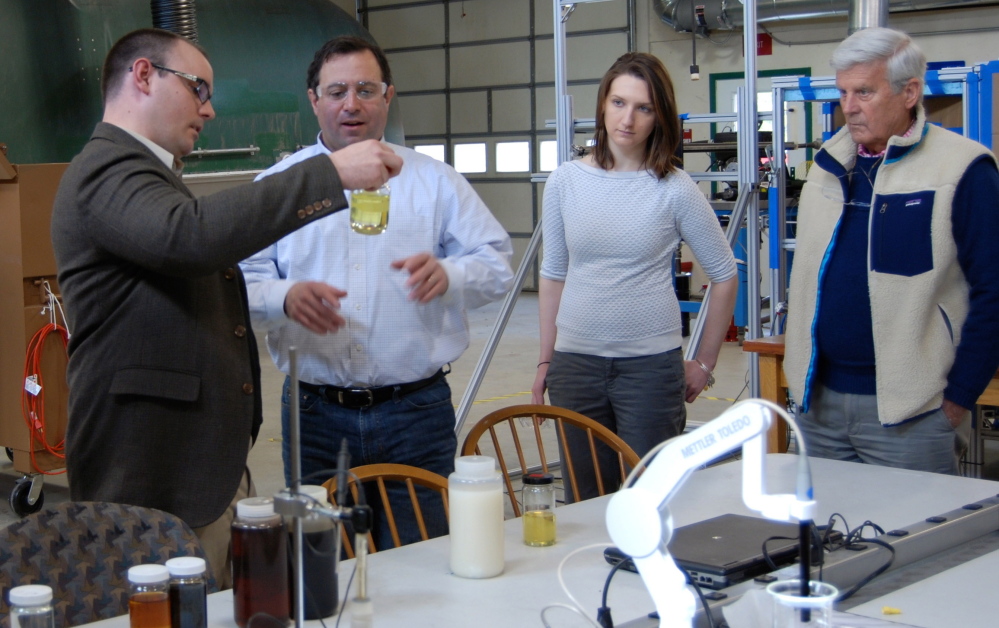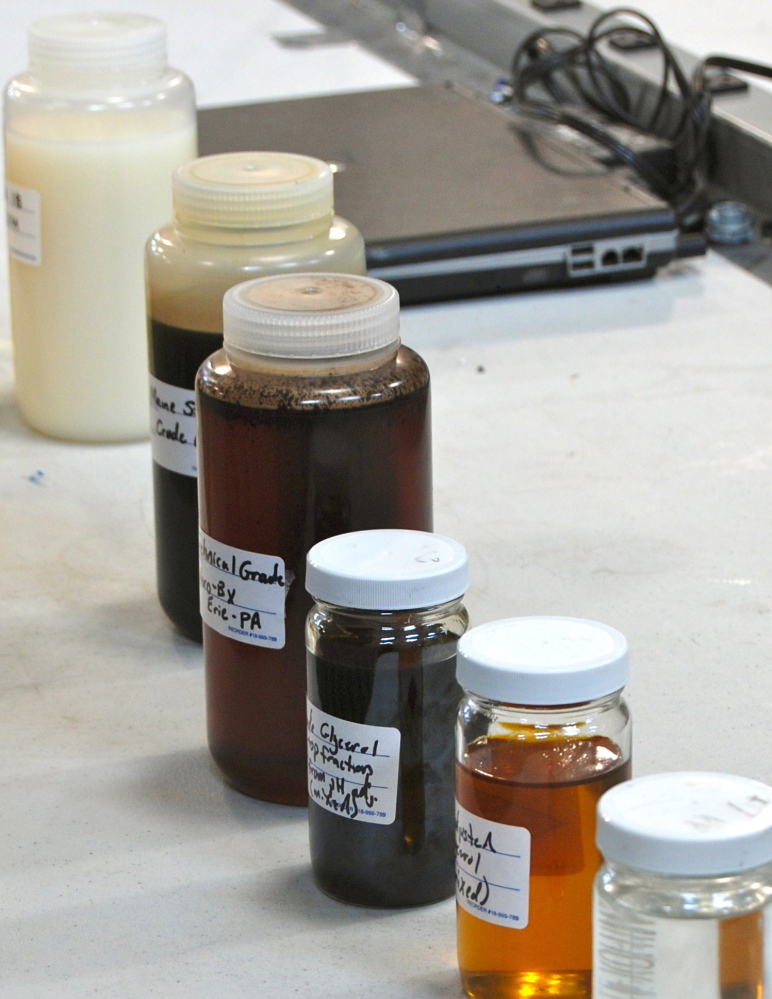Boats belonging to the Maine Maritime Academy will fill up with a new kind of fuel this spring, a mixture of diesel and glycerol that has the potential to improve air emissions and lower operating costs.
The blend, called Eco-Hybrid Fuel, was developed by a startup company with close ties to the school. Performance testing begins on Maine Maritime Academy vessels by early June and will continue through the winter, testing the fuel’s performance in real conditions such as cold weather and rough seas.
Later this year, the company behind the project, SeaChange Group LLC, plans to look for investors who can help bring the fuel to the commercial market in 2015. The company’s name is derived from the maritime industry’s “sea change towards environmental stewardship,” said Scott Eaton, chief technology officer. Eaton, a former laboratory engineer at Maine Maritime Academy, co-founded the company with five others.
He concedes SeaChange has some stiff competition as the maritime industry – notorious for its use of low-grade fuels and that emit clouds of black soot, nitrogen oxide and greenhouse gases – is under increasing regulatory pressure worldwide to clean up its emissions. What sets SeaChange apart is that it has invented a “drop in” fuel that doesn’t require engine modifications, and will be cheaper than regular diesel, said Eaton.
Eco-Hybrid Fuel has deep roots with the academy. The initial concept for the fuel, which uses glycerol – an odorless, sweet-tasting sugar alcohol compound that is a byproduct of biodiesel production – was first developed in 2009 by Bob Ring, a marine engineering graduate from the Maine Maritime Academy. Testing for the fuel will be conducted at the school’s new marine engine testing and emissions laboratory in Castine. The fuel recently received a patent from the U.S. Patent and Trademark Office, and was invented though a collaborative process involving graduates and employees of the academy. Eaton and George Harakas, a chemistry teacher at Maine Maritime Academy, are listed as co-authors on the patent for the fuel.
New direction for Maine Maritime Academy
The project also illustrates a major change at the Maine Maritime Academy, which has traditionally trained merchant mariners. Now the school sees itself as a partner in developing new marine technology, said Richard Kimball, an engineering professor at the academy and director of the school’s marine engine testing and emissions laboratory. The lab was set up last year with the help of a $1.4 million grant from the U.S. Department of Transportation.
Kimball said the school has come to realize that it can use its assets and the expertise of its staff to develop new technology that helps the Maine economy and the maritime industry. Robert Martin, president of the Maine Technology Institute, which gave SeaChange a $225,000 development loan, said the academy’s willingness to partner with companies such as SeaChange bodes well for Maine’s maritime economy. Students will also benefit. Rather than simply learning trade, he said, they’re learning how to develop new products, a skill they will find has great value in the workplace.
“One of the things we really focus on is helping the whole community in Maine learn about the value of innovation,” he said.
The company’s target market is mid-sized commercial vessels, such as tugboats and coastal ferries. Eventually, the product could be marketed to railroads for use in diesel locomotives, said Sam Bishop, a business consultant hired last fall and the company’s interim chief executive officer.
The company, which has an office in Brunswick and two contract employees, Eaton and Bishop, is owned by a group of 12 people whose investment consists primarily of sweat equity.
To date, the company has received approximately $750,000 in funding, mostly in the form of grants, from several sources including the National Science Foundation and the Department of Energy.
The company is now finalizing its emulsification formula for mixing diesel and glycerol, two substances that normally separate when combined, like oil and water, Bishop said. While the fuel is performing well in the Maine Maritime Academy lab, the company will need to test the fuel for an extended time on a real vessel to convince mariners to use it, Bishop said.
“The people we ultimately have to convince are the captains, who have the final say on whether this fuel is going to run on their boats or not,” he said.
People in the maritime industry are cautious about trying new products because they work in a dangerous environment and mistakes costs lives, Kimball said.
“But they are also pretty interested in cost-savings,” he said. “When they see something working, they become more convinced.”
Tom Bell can be contacted at 791-6369 or at:
tbell@pressherald.com
Send questions/comments to the editors.




Success. Please wait for the page to reload. If the page does not reload within 5 seconds, please refresh the page.
Enter your email and password to access comments.
Hi, to comment on stories you must . This profile is in addition to your subscription and website login.
Already have a commenting profile? .
Invalid username/password.
Please check your email to confirm and complete your registration.
Only subscribers are eligible to post comments. Please subscribe or login first for digital access. Here’s why.
Use the form below to reset your password. When you've submitted your account email, we will send an email with a reset code.